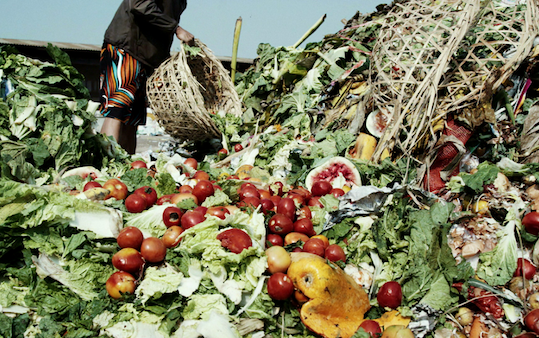To end hunger and undernutrition by 2025—the goal of IFPRI-led Compact2025—reducing food waste and loss must be part of the solution. Globally, about a third of all food is lost or wasted every year—accounting for a quarter of the calories that would have been available for human consumption. In a world where 1 in 9 people go hungry, food loss and waste are urgent issues for hunger reduction.
Food loss also implies losses in nutrition, due to the loss of nutritious crops or deteriorating quality. Nutrient-rich foods such as fruits and vegetables have the highest loss and wastage rates of any food products. Further, while there is limited information on micronutrient losses in food value chains, studies have estimated Vitamin A losses occur from food loss and waste. Considering the micronutrient deficiencies worldwide, nutrient losses could have significant impacts on efforts to reduce hidden hunger and undernutrition.
Food safety concerns also lead to quality losses and can have devastating impacts on nutrition and health. For example, aflatoxin contamination in Africa is a significant concern due to health risks from exposure as well as the lack of market incentives to improve safety standards. Without improvements along the product value chain, this hinders consumers as well as smallholder farmers from fully benefiting from high-quality, nutritious foods.
Moreover, about $940 billion worth of food is lost or wasted each year throughout the entire food supply chain. In developing countries, food losses have significant implications on the income of smallholder farmers, who dominate food production and account for a large proportion of the poor and undernourished populations. On-farm losses reduce the quantity of crops to be sold, thereby reducing the income of farmers, especially smallholders.
It is critical to reduce food losses to improve food security, nutrition, and smallholder incomes. Yet, especially in developing countries, it is still unclear what the magnitude of these losses is and where exactly they occur along the value chain for different crops and countries—and therefore difficult to design targeted policies and programs to reduce food loss.
To address these knowledge gaps, researchers at IFPRI have made progress in developing better methodologies that include pre-harvest food losses. A recent study on major crops in Ecuador, Peru, Guatemala, Honduras, and Ethiopia finds that losses are highest at the producer level and most deterioration occurs before harvest—stages of the supply chain that have been omitted in previous food loss studies. Another study based in Malawi found that production losses are concentrated in harvest and processing for groundnuts and maize, and the loss was highest during processing for soy.
In order to address food loss in developing countries, a whole value-chain approach is necessary. Solutions should not only benefit consumers with lower prices and greater nutrition value, but also support smallholder farmers. While many interventions target storage, conclusions from various studies suggest that targeting other points along the value chain is worthwhile. Furthermore, innovative policy solutions for smallholders could have great impact. It will be critical for policy makers and actors along the food value chain to use these insights to take action. Compact2025 can play a key role in bringing together stakeholders to engage at the country level, stimulate innovation, and support learning and partnerships.
To help address these key challenges, the international community agreed to halve global food losses and waste by 2030 under Sustainable Development Goals (SDGs) target 12.3. On September 20, I will join fellow champions and partners of SDG 12.3 from various sectors to launch of the progress report on SDG target 12.3 and discuss the next steps.
Shenggen Fan is Director General of IFPRI. This post first appeared on the Compact2025 website.







